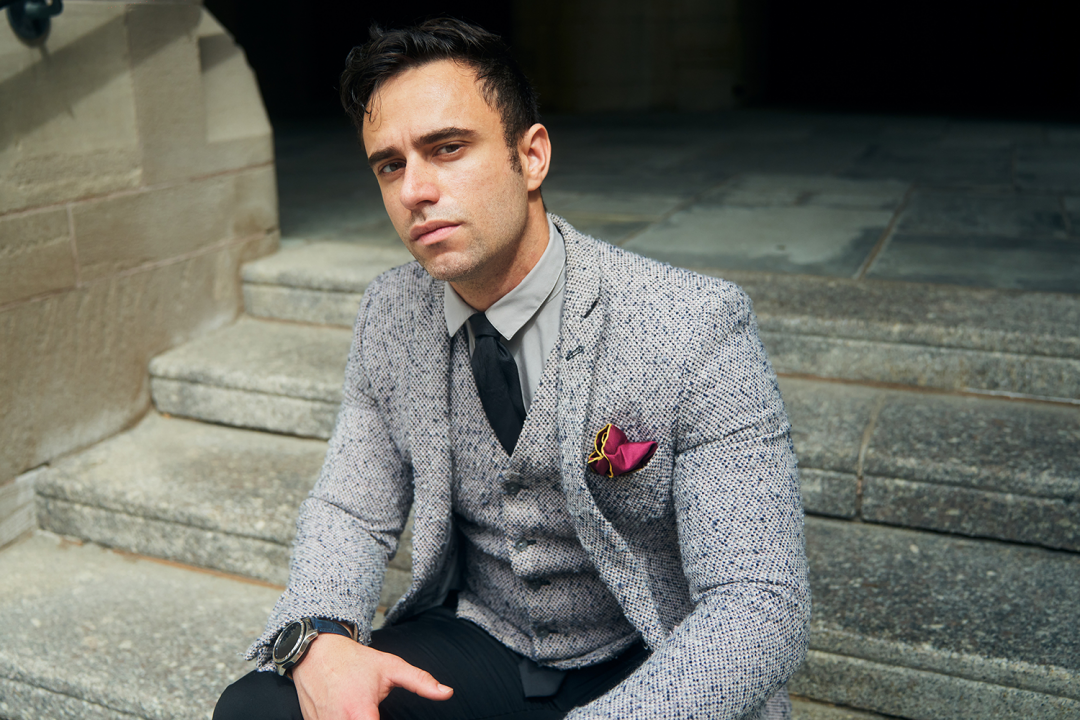
Gary Wolff was moving fast and talking faster as he strode up and down stairways, pushed through doors, and moved from room to room in the refurbished Trachten-Zachs Hillel House on North Eagleville Road.
“I like to say that this is where Starbucks meets Barnes & Noble meets Bookworms Café,” said Wolff, director of Hillel since July 2009, waving his arms to embrace the entirety of the 950-square-foot community room. The room includes the largest video screen on campus that isn’t called a theater, a small kitchen area, several dozen tables, and space for more than 200. A center by day, it easily converts on Friday nights for Shabbat, which is followed by a kosher dinner.
Wolff says the new Hillel provides a place that UConn’s nearly 2,000-strong Jewish student population can call home.
“We want the students to feel at home; we want to enrich the lives of Jewish undergraduates and graduates, here and around the world,” he says.
He is quick to add, however, that Hillel is “pluralistic and non-separatist. We welcome with open doors all undergraduates on campus,” he says. Open access also now, thanks to the renovations, includes accessibility for people with disabilities.
The 8,500-square-foot building, which opened during the summer, features a variety of conference rooms, a large, comfortable game room in the basement, a library, and a quiet second floor study area replete with computers and printers. The entire building, including a slate patio in the rear, is wireless.

It wasn’t always this way.
Hillel first came to UConn in 1933, and the building opened in 1949. Flooding and mold forced officials to shutter the building several years ago, and students and Hillel staff were forced out into the ground floor of Souza/Lafayette, a residence hall in the Towers complex, two years ago.
UConn benefactor Henry Zachs says Hillel “was a total mess. A total mess. I’m thrilled with how it turned out, especially knowing the way it was. We used the best materials – marble in the lobby, the best carpeting, everything.”
A rededication of the facility will be held Oct. 10 at 2 p.m.
The contractors, HMZ Contracting, also installed a slate sidewalk leading to the building, and a large slate patio behind the structure. In all, says Wolff, the project will cost nearly $2 million, all of it coming from “investments.”
“I don’t like to say ‘donated,’ or ‘contributed,’” Wolff says. “Our friends have stepped up and decide to invest in our students, in their future, in the future of Hillel.” The investments have been large enough and plenty enough to also create an endowment of more than $1 million for the future.
Zachs and Morris Trachten, whose names now grace the center, each “invested” more than $1 million. Trachten also invested $150,000 in 2003 to fund the Morris N. Trachten Kosher Dining Facility in Gelfenbein Commons. Zachs is a long-time philanthropist who, with his wife Judith (School of Social Work, ’77) has donated to numerous projects at UConn, its Health Center, and the schools of social work and fine arts.

“We knew it had to be replaced,” says Trachten. “The basement was unusable. Now it’s a beautiful area. The building is lively, new, fresh.”
Although the refurbished building was constructed in a manner that will allow three separate services on Friday nights – for Conservative, Reform, and Orthodox Jews – Wolff cautions against perpetuating the myth that Hillel is merely a religious center.
“That’s a mistake. It’s more a social and cultural institution,” he says. “This is a place where students can sit and explore their own identity in a place they can call home. It covers the whole gamut of what a religious and cultural institution would.
“If you are a Jewish parent there is absolutely no reason you should not send your child to UConn,” Wolff adds. “It’s a great University with a great Hillel, a great kosher kitchen, and a great student body.”


